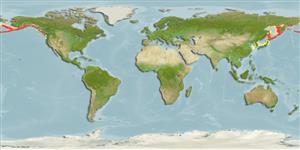分类 / Names
俗名 | 同种异名 | Catalog of Fishes(属, 种) | ITIS | CoL | WoRMS | Cloffa
Elasmobranchii
板鳃亚纲 (鲨鱼与 鱼) (sharks and rays) >
Rajiformes (Skates and rays) >
Arhynchobatidae (Softnose skates)
Etymology: Bathyraja: Greek, bathys = deep + Latin, raja, -ae = a ray (Raja sp) (Ref. 45335).
Environment: milieu / climate zone / depth range / distribution range
生态学
海洋 居于水底的; 深度上下限 20 - 1110 m (Ref. 50550). 溫帶
Northwest Pacific: Sea of Okhotsk off Hokkaido, Japan to the Kamchatka Peninsula.
西北太平洋: 鄂霍次克海外海的日本北海道到堪察加半島。
Length at first maturity / 大小 / 重量 / 年龄
Maturity: Lm 68.5, range 61 - 76 cm
Max length : 102 cm TL 雄鱼/尚未辨别雌雄; (Ref. 52075)
Oviparous. Distinct pairing with embrace. Young may tend to follow large objects, such as their mother (Ref. 205). Eggs are oblong capsules with stiff pointed horns at the corners deposited in sandy or muddy flats (Ref. 205). Egg capsules are 8.5 cm long and 6.7 cm wide (Ref. 41249).
卵生的。 明显的成对出现。 幼鱼可能倾向跟随大的个体, 例如他们的母亲.(参考文献 205) 卵为长方形鞘囊具有僵硬的触角沈积在沙滩或泥滩的角落.(参考文献 205) 卵鞘是 8.5 公分长与 6.7 公分宽的.(参考文献 41249)
Life cycle and mating behavior
成熟度 | 繁殖 | 产卵场 | 卵 | 孕卵数 | 仔鱼
Oviparous, paired eggs are laid. Embryos feed solely on yolk (Ref. 50449). Distinct pairing with embrace. Young may tend to follow large objects, such as their mother (Ref. 205).西北太平洋: 鄂霍次克海外海的日本北海道到堪察加半島。
McEachran, J.D. and K.A. Dunn, 1998. Phylogenetic analysis of skates, a morphologically conservative clade of elasmobranchs (Chondrichthyes: Rajidae). Copeia 1998(2):271-290. (Ref. 27314)
世界自然保护联盟红皮书 (Ref. 130435: Version 2024-2)
人类利用
工具
特别资料
下载 XML
网络资源
Estimates based on models
Preferred temperature (Ref.
123201): 0.7 - 5.5, mean 2 °C (based on 268 cells).
Phylogenetic diversity index (Ref.
82804): PD
50 = 0.5000 [Uniqueness, from 0.5 = low to 2.0 = high].
Bayesian length-weight: a=0.00468 (0.00321 - 0.00681), b=3.05 (2.94 - 3.16), in cm total length, based on LWR estimates for this species & Genus-body shape (Ref.
93245).
营养阶层 (Ref.
69278): 3.5 ±0.48 se; based on food items.
回复力 (Ref.
120179): 低的, 最小族群倍增时间4.5 - 14 年 (Fec assumed to be <100).
Fishing Vulnerability (Ref.
59153): High vulnerability (61 of 100).
